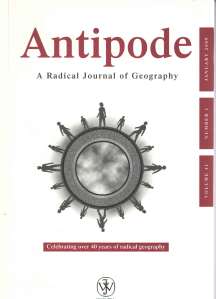 I’m very pleased to announce that our new article “The mediation and remediation of disaster: Hurricanes Katrina and Felix in/and the new media environment” is now published online in Antipode. This article is part of the Geographies of Media Convergence research project, funded by the Marsden Fund of the Royal Society of New Zealand.
I’m very pleased to announce that our new article “The mediation and remediation of disaster: Hurricanes Katrina and Felix in/and the new media environment” is now published online in Antipode. This article is part of the Geographies of Media Convergence research project, funded by the Marsden Fund of the Royal Society of New Zealand.
This articles explores the mediation and remediation of two major hurricanes: Hurricane Katrina which made landfall on the Gulf Coast of the United States in 2005 and Hurricane Felix which hit the Caribbean Coast of Nicaragua in 2007. Inspired by scholarship in the modernity/coloniality/decoloniality paradigm, we wish to emphasize the historical connections between these two sites. Their inhabitants are subject to similar modes of racialized Othering and internal colonialism, and both places have vital links with the transnational cultural consciousness that Paul Gilroy referred to as the Black Atlantic. Indeed, both sites are seen to not properly belong to the nation-states in which they are located and in both cases the disaster produced an inadequate government response. People suffered not just because these were large hurricanes but because of racism, social neglect and the refusal of states to respond to the needs of their citizens. Katrina and Felix also occurred at a time when centralized forms of media are increasingly perceived to be in crisis. This crisis is creating new spaces for the development of alternative ways of knowing, watching and making media. As content pertaining to the hurricanes has moved across media platforms, ways of knowing rooted in the material conditions of everyday life have emerged and have disrupted common sense understandings of disasters as natural, one-off localized events. We’re suggesting that activists should understand the distinctions between mainstream (or corporate) and alternative media, between top-down and grassroots media, and between “old” and “new” media, in relational and non-categorical rather than absolute terms. We are hugely supportive of grassroots/community/alternative media but these media don’t exist in isolation from for-profit media. Different media realms interact with and impact upon one another. In the case of Katrina and Felix, this movement of material across media platform, the different ways in which people have engaged with news and current affairs, TV drama, blogs, Facebook and YouTube clips have emphasized how these disasters must be understood as ongoing and open-ended events embedded within historical, social, cultural, economic and political processes and systems. Media, policymaking and emergency management practices that are informed by an awareness of this complex embedding, and which are therefore able to take a long-term view of the unfolding of disasters, will be best equipped to engage effectively, and in democratically responsive ways, with disasters and in particular with the needs of those populations most vulnerable to their impacts. We need to be vigilant about how in these neoliberal times, inequalities embedded in race and class disadvantage increase vulnerabilities to disaster and how disasters are opportunistically seized by neoliberalizing forces, a phenomenon Naomi Klein has called disaster capitalism. We must also look at the role played by the new media environment in creatively challenging this depressing state of affairs.
I would like to dedicate this article to Hardy Jackson whose tragic and moving story was repeatedly captured in the remediation of the disaster and who died shortly after this article was submitted.
You can find the article here. If you don’t have access to Antipode through a university library, email me for a copy.
http://onlinelibrary.wiley.com/doi/10.1111/anti.12060/abstract
